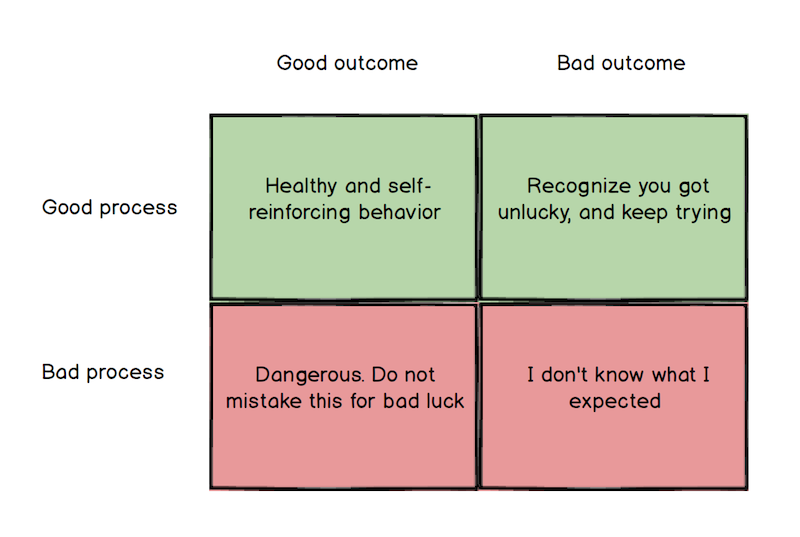Being results oriented may incentivize you to continuously make poor decisions over time.
“At gambling, the deadly sin is to mistake bad play for bad luck.”
Sometimes you get lucky, and achieve a good outcome with a bad process or bad decision. And sometimes you get bad outcomes from good processes and good decisions. Success or failure is dependent on understanding the difference, and having the discipline to keep making the right decisions.
The green boxes in the upper quadrants represent good things you want to repeat, over and over again. The red boxes in the lower quadrants represent things you need to stop doing ASAP, no matter the outcome.
The easiest of the group to repeat best practices are good processes that lead to good outcomes, and bad processes that lead to bad outcomes. The former provides a lot of good incentives to keep repeating what you’re doing. The latter gives strong, often painful reinforcement to not try that again.
The hardest of the group to stick to, are the ones we need to focus on. Get these wrong and you will sink your business.
Good processes leading to bad outcomes may discourage you from trying again. No one wants to keep facing bad outcomes. But you have to grit your teeth and keep going. Discipline in repeating good processes will show compounding, long term benefits.
Bad processes leading to good outcomes is the worst quadrant. These outcomes will strongly encourage you to continue to execute bad decisions. This will lead to disaster in the long term if you don’t correct this behavior. Bad processes and decisions leading to good outcomes is really the core issue with being results oriented: being incentivized into making bad decisions that you keep chasing over and over again.
So how can you identify good decisions from bad decisions, if you can’t just focus on the outcomes?
A good framework involves just taking the time to think critically through things. What are the second and third order effects of a decision? Will you fix one problem and cause two more problems? Train yourself to follow decisions to their logical conclusions.
Also think of your outcomes in probabilities. If I were to make this same decision 100 times, what would happen? Would I get good outcomes 80%? 20%? 80% equity feels like a pretty good decision. 20% feels like it’s time to get back to the drawing board. There is a great book from Annie Duke, Thinking in Bets, that covers some of these concepts.
So don’t be mislead just because you’re getting lucky. You owe it to your business to take the time to ensure you are always making good decisions.


